In 2018, NIDA was pleased to host multi-award-winning international guest director Oleg Glushkov for a highly unique, once-off theatre project with a cohort of our students.

A moment from Ah Tuzenbach, A Melancholic Cabaret. Photograph by Patrick Boland
In 2018, NIDA was pleased to host multi-award-winning international guest director Oleg Glushkov for a highly unique, once-off theatre project with a cohort of our students.
Oleg joined us from the Russian Institute of Theatre Arts (GITIS), the largest and oldest independent theatrical arts school in Russia, established in 1878.
Both a director and a choreographer, Oleg’s work has won the Golden Mask Theatre Award and the Russian Federation Government Prize. His work on the film Hipsters with director Valery Todorovsky won several Golden Eagle and Nika Awards, including Best Film in both.
Working with a company comprising 12 of NIDA’s second-year Bachelor of Fine Arts (Acting) students, and six of our CUA50213 Diploma of Musical Theatre/10196NAT Stage and Screen Performance students, Oleg directed and devised an immersive, interactive piece inspired by the theatrical world of Anton Chekhov: Ah Tuzenbach, A Melancholic Cabaret.
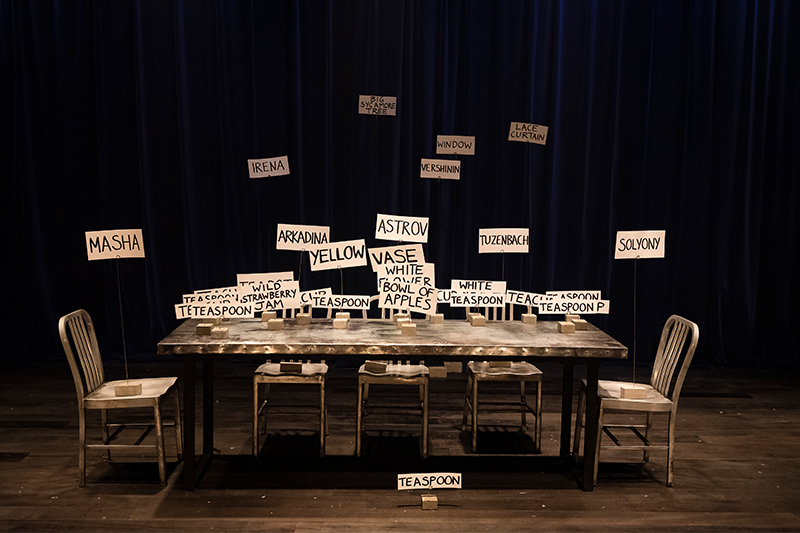
Stage scene from Ah Tuzenbach, A Melancholic Cabaret, with Chekhovian elements on the table. Photograph by Patrick Boland
The students co-devised Ah Tuzenbach, A Melancholic Cabaret with Oleg, as they sought to create a performance space in which Chekhov’s work ceased to be distant and scholarly.
On how the idea to create such a non-traditional theatre work came about, Oleg said, “It happened very accidentally. The plan when Egil [Kipste, Director, Centre for Creative Practices] invited me to NIDA was completely different – to make just an ordinary show for the stage.
‘When we had a workshop in April and I saw the venues in NIDA, I suggested to Di [Misirdjieff, NIDA Producer] and John [Bashford, Director, Centre for Acting], almost as a joke, “I’m interested in creating this sort of theatre- very personal, very special. Let’s do a performance for very few audience members.”
‘And of course, I wasn’t expecting to hear yes. Mostly I was expecting, “Ok, that’s a very nice idea, but let’s be down to earth.” But they said yes. And it was really unexpected, and I was really happy for this opportunity to do something strange.
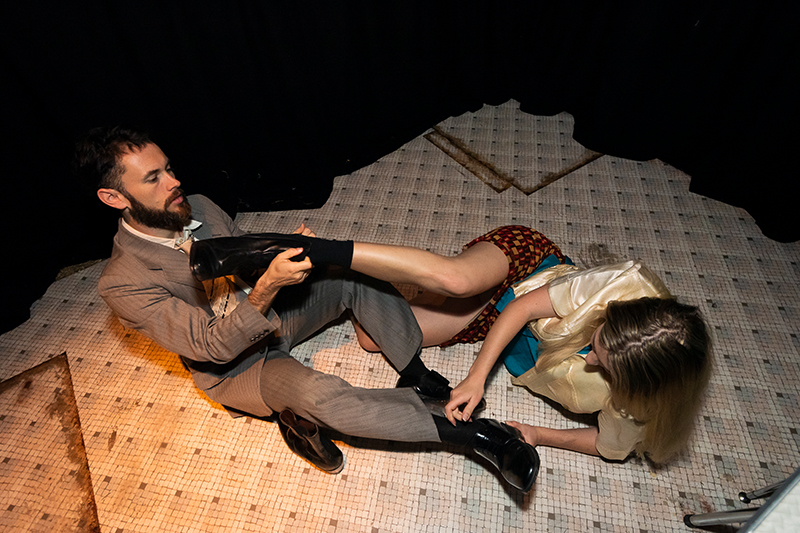
A moment from Ah Tuzenbach, A Melancholic Cabaret. Photograph by Patrick Boland
‘We wanted to create a purely personal experience – where you don’t share your experience with a whole theatre of 500 people. In this project, every audience member is separated from the others.
‘For perhaps 80% of the show, each audience member doesn’t see anything outside of the room they are in. When you’re really alone you can fully trust your experience. You don’t see what happens in front of you through the eyes of a friend. And it’s a challenge because for many people, myself included, it’s difficult to be alone.’
Oleg worked with the acting students first in a week-long movement intensive in April, and then returned in October for six weeks of rehearsals leading up to the October Season of Student Productions in which the work was presented.
One of NIDA’s Master of Fine Arts (Design for Performance) students, Christopher Baldwin, was the set, props and costume designer for the piece, and worked with Oleg over four months developing the concept.
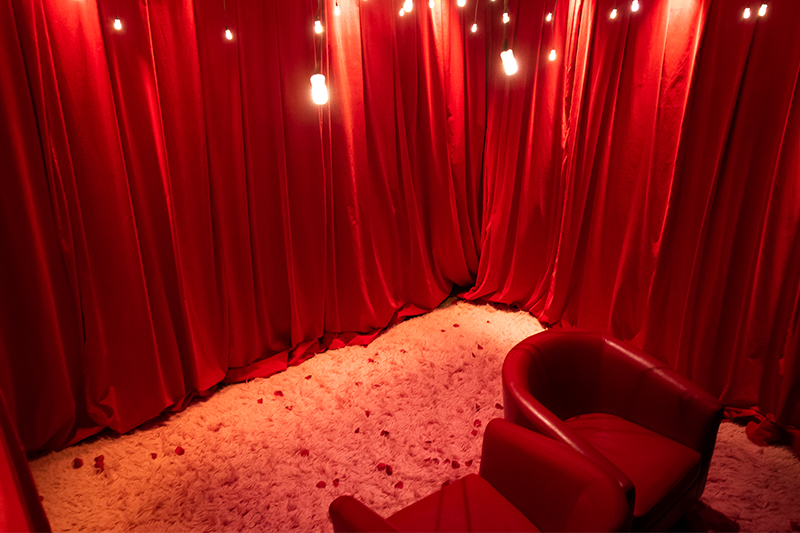
‘Love Hotel’ room from Ah Tuzenbach, A Melancholic Cabaret. Photograph by Patrick Boland
The unique set included nine individual ‘rooms’ separated by black curtain dividers. The dividers separated the rooms and isolated each audience member, and the performers, into differently themed spaces.
‘A lot of the spaces that we created in this theatre were spaces that we wanted to feel very lived in- and also ‘forgotten about’ in some way, as well,’ Christopher explained.
‘Within this set, I’m currently sitting in what we call The Piano Room, and behind me is the Chiffonier Room (or ‘buffet’), which is a very common Russian, Chekovian style of room.’
‘All of the objects here have been sourced by myself and my props supervisors. Some of them are objects I interact with every day in my own home, which helped me to create something that was very real and very lived in.’
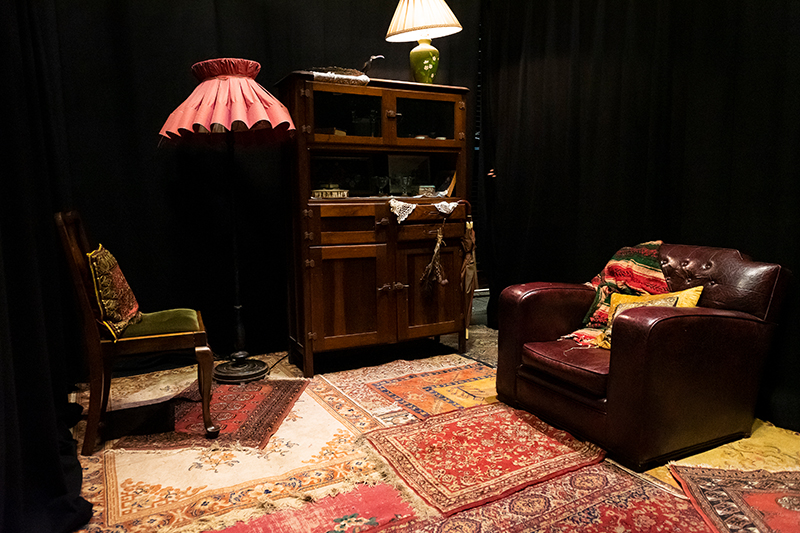
‘Chiffonier Room’ from Ah Tuzenbach, A Melancholic Cabaret. Photograph by Patrick Boland
The unique set and performance-style created interesting challenges for the technical staff.
Deputy stage manager on the project, second-year Bachelor of Fine Arts (Technical Theatre and Stage Management) student, Ayah Tayeh, said, ‘The challenges that I found, working on this piece, started with the curtains.
‘We had a version of the curtains up in the rehearsal space, separating all the nine ‘rooms’, so as a stage manager this made it very difficult to take down any of the blocking or understand the direction of the show because my view was constantly obstructed.
‘The way I managed to get around that was, I took my notebook and I ran around after the actors and Oleg and wrote down everything they did and said – and hoped for the best!
‘By working with Oleg I learned a lot on how to just make things happen. It doesn’t always have to be the most complicated solution, it can be the simplest solution and it will still look beautiful. I learnt a lot about just trying to put a ‘version one’ out there on the stage and then building from there.’
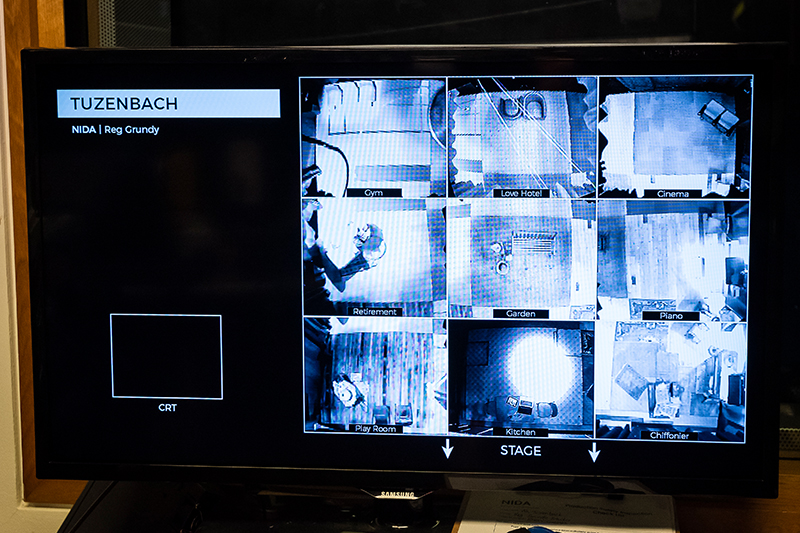
Behind-the-scenes: Conrol room forAh Tuzenbach, A Melancholic Cabaret. Photograph by Patrick Boland
Second-year Bachelor of Fine Arts (Acting) student, Melissa Kahraman, from the cast of Ah Tuzenbach, A Melancholic Cabaret, explained what it was like performing in an audience-immersive project:
‘We interact with the audience in each performance, to varying levels, and for each performance it changes. There are opportunities for us to play with them, interact, talk with them, or walk past; there are varying levels of interaction.
‘In Australia you don’t see a lot of interactive theatre; it’s quite rare. What’s nice about working with Oleg is that where he’s from, in Russia, this kind of theatre happens all the time, and it’s a type of theatre he’s really interested in. So he’s brought [this different theatre tradition] to us, and now we’re able to gift it to other people, which is really exciting.’
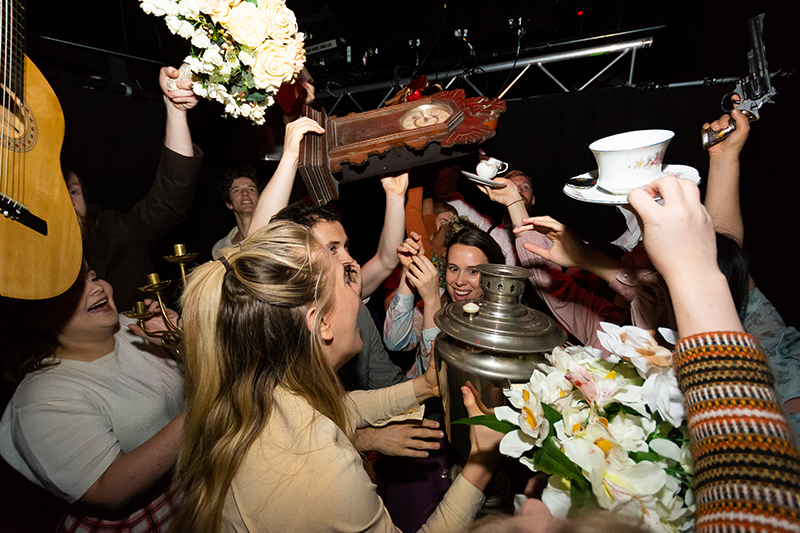
A moment from Ah Tuzenbach, A Melancholic Cabaret. Photograph by Patrick Boland
